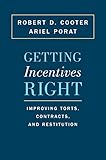Getting Incentives Right : Improving Torts, Contracts, and Restitution / Ariel Porat, Robert D. Cooter.
Material type: TextPublisher: Princeton, NJ : Princeton University Press, [2014]Copyright date: ©2014Edition: Course BookDescription: 1 online resource (240 p.) : 11 line illus. 4 tablesContent type:
TextPublisher: Princeton, NJ : Princeton University Press, [2014]Copyright date: ©2014Edition: Course BookDescription: 1 online resource (240 p.) : 11 line illus. 4 tablesContent type: - 9780691151595
- 9781400850396
- Business & Economics -- Economics -- General
- Compensation (Law) -- United States
- Contracts -- United States
- Law -- Administrative Law & Regulatory Practice
- Liability (Law) -- United States
- Negligence -- United States
- Restitution -- United States
- Torts -- United States
- LAW / Torts
- Learned Hand formula
- accidents
- anti-insurance
- assistance interest
- assistance
- attention lapse
- background risk
- bargains
- benefits
- breach of contract
- care standards
- causal link
- causation
- common law negligence
- comparative fault
- compensation
- contract law
- damage mitigation
- damages
- dead-weight losses
- decreasing liability contracts
- discontinuity
- disgorgement damages
- double responsibility
- equalization principle
- excessive harm
- expanded duty of restitution
- foreground risk
- gains
- harm
- incentives
- joint risks
- lapse defense
- lapses
- liability externalities
- liability law
- liability
- liquidated damages
- losses
- mandatory choices
- misalignment
- negligence law
- negligence per se
- negligence
- net burden
- net damages
- nonlegal sanctions
- nuisance
- optimal harm
- paradox of compensation
- performance
- phased contracts
- positive externalities
- precautions
- prices
- private law
- private supply
- progress payment contracts
- proportionate liability
- public goods
- renegotiations
- restitution law
- risks
- sanctions
- self-risk
- social costs
- social harm
- standards of care
- strict liability
- strict total liability
- substitution
- surprises
- theory of restitution
- tort law
- total harm
- total liability
- unaccounted risks
- unavoidable accidents
- unavoidable harm
- unrequested benefits
- value
- victims
- 346.7302 23
- KF1250
- online - DeGruyter
- Issued also in print.
| Item type | Current library | Call number | URL | Status | Notes | Barcode | |
|---|---|---|---|---|---|---|---|
 eBook
eBook
|
Biblioteca "Angelicum" Pont. Univ. S.Tommaso d'Aquino Nuvola online | online - DeGruyter (Browse shelf(Opens below)) | Online access | Not for loan (Accesso limitato) | Accesso per gli utenti autorizzati / Access for authorized users | (dgr)9781400850396 |
Browsing Biblioteca "Angelicum" Pont. Univ. S.Tommaso d'Aquino shelves, Shelving location: Nuvola online Close shelf browser (Hides shelf browser)
Frontmatter -- Contents -- Acknowledgments -- Introduction -- I. Torts and Misalignments -- II. Contracts and Victims' Incentives -- III. Restitution and Positive Externalities -- Conclusion -- Table of Cases -- Table of Books and Articles -- Subject Index
restricted access online access with authorization star
http://purl.org/coar/access_right/c_16ec
Lawyers, judges, and scholars have long debated whether incentives in tort, contract, and restitution law effectively promote the welfare of society. If these incentives were ideal, tort law would reduce the cost and frequency of accidents, contract law would lubricate transactions, and restitution law would encourage people to benefit others. Unfortunately, the incentives in these laws lead to too many injuries, too little contractual cooperation, and too few unrequested benefits. Getting Incentives Right explains how law might better serve the social good.In tort law, Robert Cooter and Ariel Porat propose that all foreseeable risks should be included when setting standards of care and awarding damages. Failure to do so causes accidents that better legal incentives would avoid. In contract law, they show that making a promise often causes the person who receives it to change behavior and undermine the cooperation between the parties. They recommend several solutions, including a novel contract called "anti-insurance." In restitution law, people who convey unrequested benefits to others are seldom entitled to compensation. Restitution law should compensate them more than it currently does, so that they will provide more unrequested benefits. In these three areas of law, Getting Incentives Right demonstrates that better law can promote the well-being of people by providing better incentives for the private regulation of conduct.
Issued also in print.
Mode of access: Internet via World Wide Web.
In English.
Description based on online resource; title from PDF title page (publisher's Web site, viewed 30. Aug 2021)









